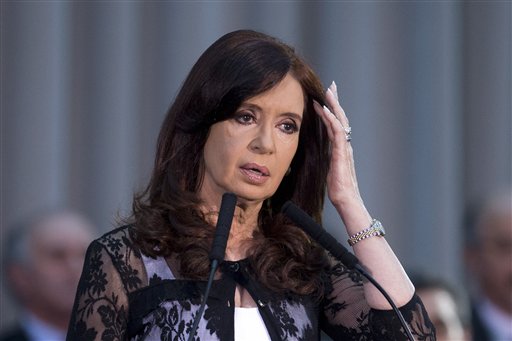(AP) Corruption scandal swirls around Argentine leader
By MICHAEL WARREN
Associated Press
BUENOS AIRES, Argentina
New corruption allegations are swirling around the Argentine president, who ordered her personal secretary to read a blistering statement Tuesday accusing the nation’s leading newspapers of lying and defaming her “in the best style of fascism.”
The scandal centers on Lazaro Baez, an old friend and business partner of President Cristina Fernandez and her late husband, President Nestor Kirchner. “Austral Construcciones” and other Baez companies have won many public works contracts during the Kirchners’ decade in office.
The couple’s declared wealth has grown more than tenfold since they began leading Argentina, gains they attributed to lucky moves in real estate and the profits from several luxury hotels they own in Patagonia.
Now a series of investigative reports by the newspaper La Nacion suggests that Baez may have funneled taxpayer money from his contracts back to the Kirchners in the form of “rent” payments for rooms at the couple’s hotels.
According to La Nacion, the official books of companies owned by Baez show they spent millions of dollars to reserve a third of the Kirchners’ hotel rooms, whether the rooms were used or not. The paper also said the money-losing state-controlled airline Aerolineas Argentinas guaranteed another third of the rooms, providing a steady flow of profits to the presidential couple’s private businesses.
The presidential secretary, Oscar Parilli, went on live television to attack the story.
“The false reports by the daily La Nacion, later repeated incessantly once again by Clarin … try to put in doubt the legitimacy, legality and honesty of the private economic acts of the Presidents Nestor Carlos Kirchner and Cristina Fernandez de Kirchner,” Parilli said.
He said the allegations involve income that was properly disclosed in the president’s sworn wealth tax declarations. The news stories seek only to defame the Kirchners “in the best style of fascism,” he said.
Separately, a federal judge has been working for months to investigate allegations of money laundering, tax evasion and illicit enrichment involving Baez and his government contracts.
When Judge Jose Maria Campagnoli ordered Baez to provide sworn testimony, the contractor called him abusive. Attorney General Alejandra Gils Carbo, a Fernandez appointee, agreed with Baez last week, removing Campagnoli from the case. Now the judge is awaiting impeachment, accused of overstepping his authority in his investigation.
On Tuesday, the judge was in court seeking to overturn his removal from the case.
“Public opinion understands that corruption corrodes the foundations of the democratic system and that allegations against high-ranking officials need to be clarified. If not, we’re facing a threat against the democratic regime,” Campagnoli wrote in a 20-page appeal of his dismissal filed in Buenos Aires.
Opposition lawmakers, judges and lawyers associations, anticorruption experts and others also spoke out Tuesday in support of the judge remaining on the case.
Baez, meanwhile, asked a judge in the Patagonian city of Rio Gallegos, his hometown and the Kirchners’ political base, to issue an injunction barring the government, websites and the news media from “releasing any information or making any opinions” about his companies’ private business. Baez accused La Nacion of illegally obtaining confidential information, either from Argentina’s tax agency or its money laundering watchdog.
Publishing this information harms the company and those who run it by insinuating, “based on information illegally obtained, that there has been some form of dirty business between my client and the presidential family,” Baez’s lawyer, Juan Pablo Gregori, wrote in the injunction request, according to the local Diarios y Noticias news agency.
The filing was denounced by the Argentine Journalism Forum, which said that “investigating the links between private businesses and the State is part of the most basic work of journalism in a democracy.”

COMMENTS
Please let us know if you're having issues with commenting.